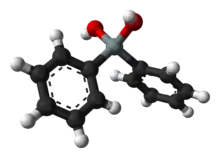 | |
 | |
| Names | |
|---|---|
| Preferred IUPAC name
Diphenylsilanediol | |
| Other names
dihydroxydiphenylsilane | |
| Identifiers | |
3D model (JSmol) |
|
| ChemSpider | |
| ECHA InfoCard | 100.012.207 |
PubChem CID |
|
| UNII | |
CompTox Dashboard (EPA) |
|
| |
| |
| Properties | |
| C12H12O2Si | |
| Molar mass | 216.308 g/mol |
| Appearance | Colorless crystals[1] |
| Odor | Odorless[1] |
| Density | 1.255 g/cm3[2] |
| Melting point | 144 to 148 °C (291 to 298 °F; 417 to 421 K) |
| Structure[3] | |
| Monoclinic | |
Except where otherwise noted, data are given for materials in their standard state (at 25 °C [77 °F], 100 kPa).
Infobox references | |
Diphenylsilanediol, Ph2Si(OH)2, is a silanol. The tetrahedral molecule forms hydrogen-bonded columns in the solid state.[4] It can be prepared by hydrolysis of diphenyldichlorosilane Ph2SiCl2. Diphenylsilanediol can act as an anticonvulsant, in a similar way to phenytoin.[4] Although the compound is stable in normal conditions, the presence of basic impurities can accelerate the condensation of the silanol groups.
References
- 1 2 https://gestis.dguv.de/data?name=002740&lang=en
- ↑ T. J. Kistenmacher; M. Rossi; L. K. Frevel (October 1978). "Crystal data for diphenylsilanediol, (C6H3)2Si(OH)2". J. Appl. Crystallogr. 11 (5): 670–671. doi:10.1107/S002188987801420X.
- ↑ https://pubs.acs.org/doi/abs/10.1021/ac60157a047
- 1 2 J. K. Fawcett; N. Camerman; A. Camerman (1977). "Stereochemical basis of anticonvulsant drug action. VI. Crystal and molecular structure of diphenylsilanediol". Can. J. Chem. 55 (20): 3631–3635. doi:10.1139/v77-510.
This article is issued from Wikipedia. The text is licensed under Creative Commons - Attribution - Sharealike. Additional terms may apply for the media files.